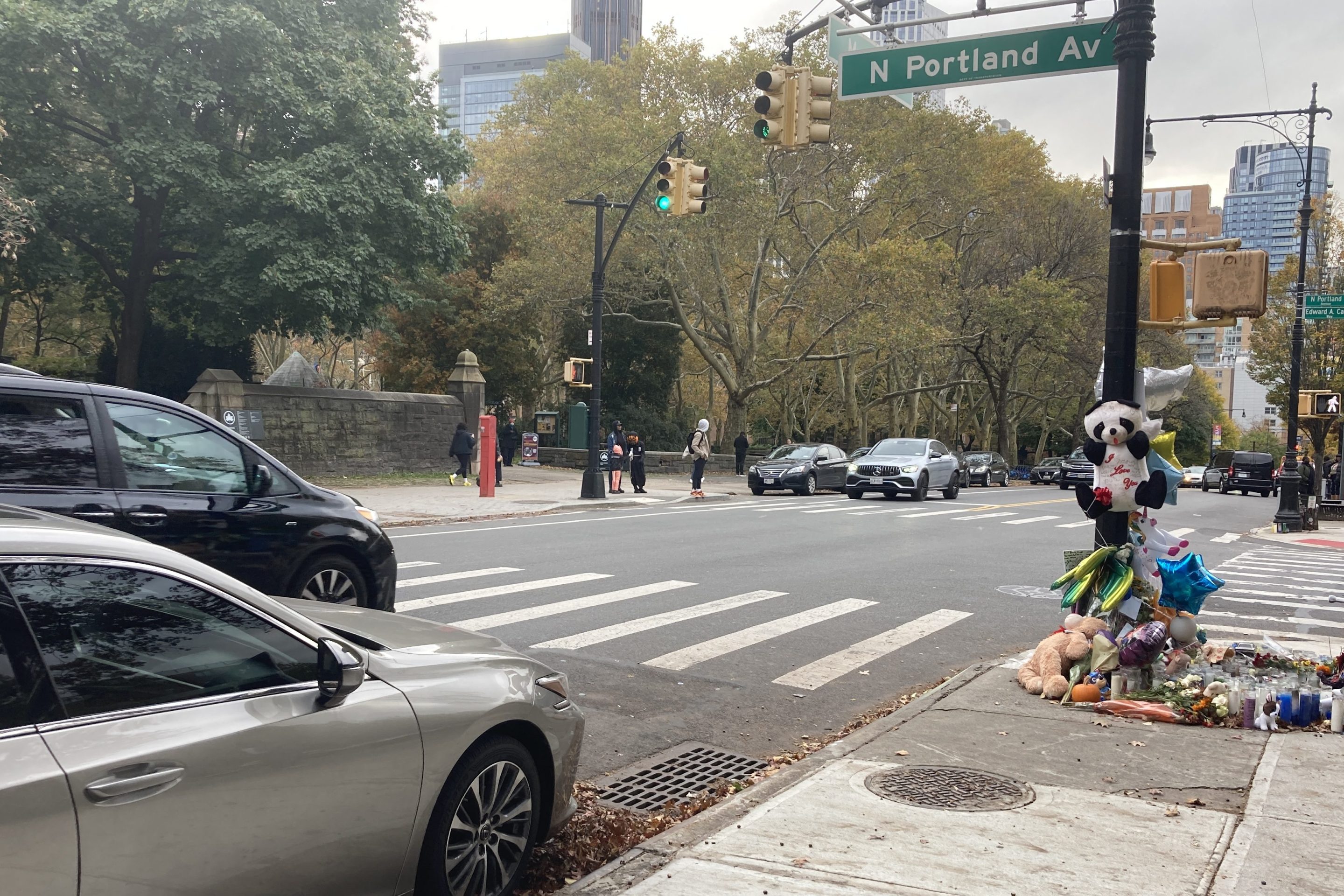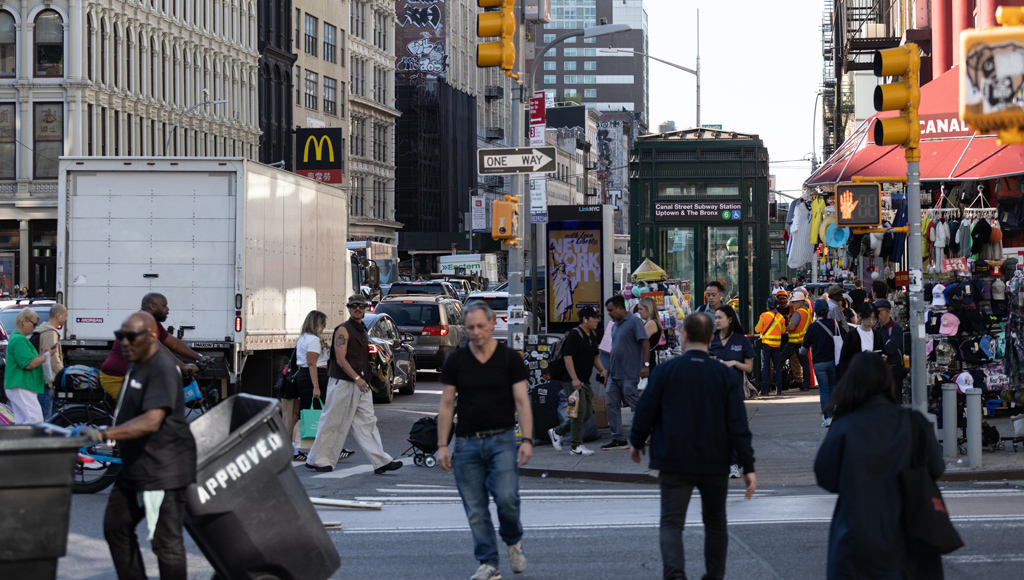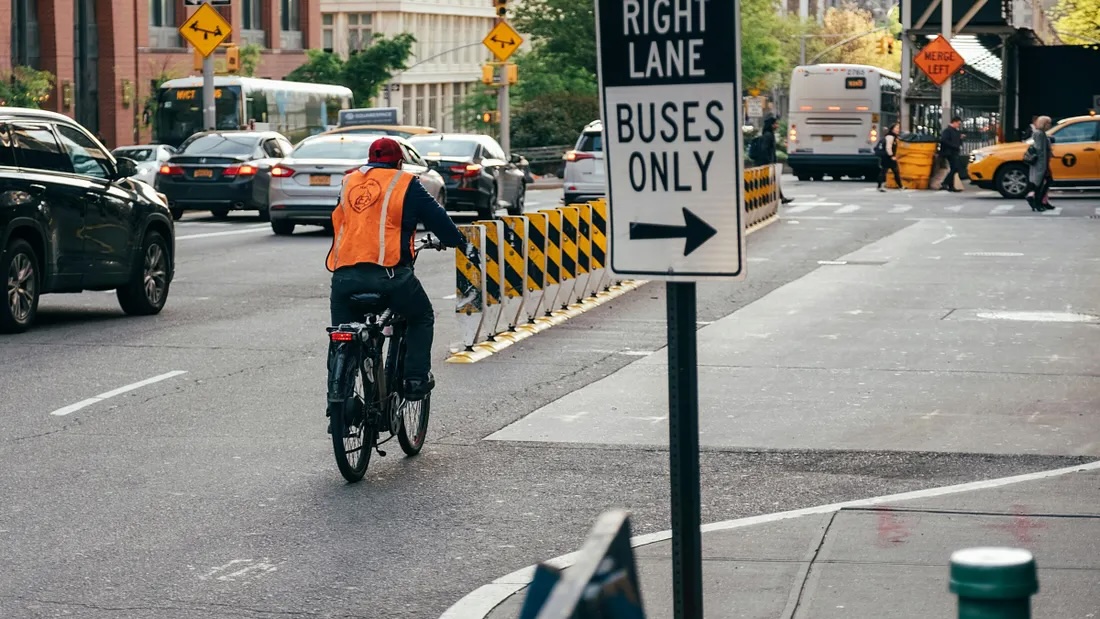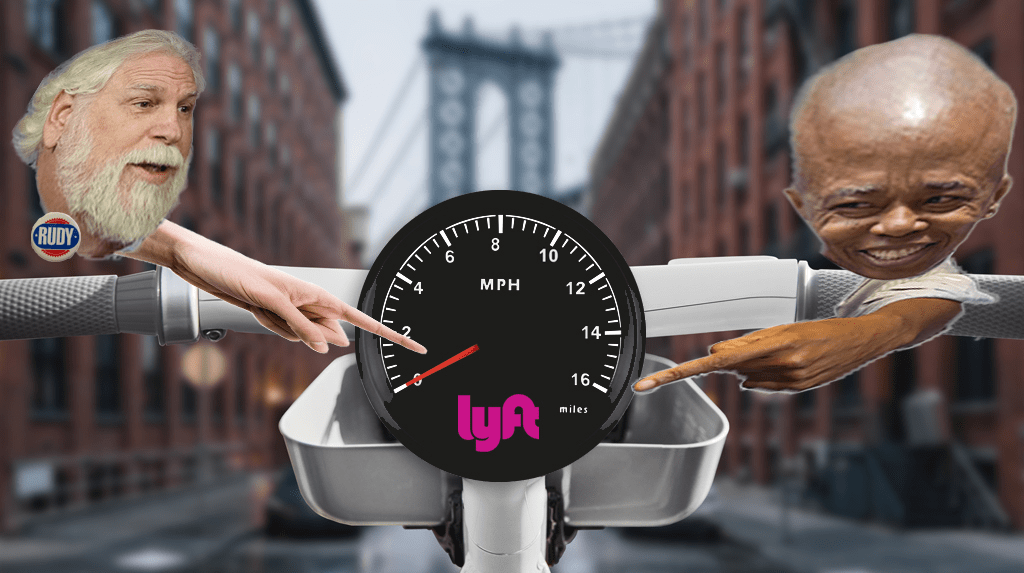The NYPD's new policy of criminally charging cyclists and e-bike riders for low-level infractions is an "obscene" ramp-up of enforcement, and it's unclear if the police can even undertake such criminalization without a law change, according to advocates and legal experts.
The shift that Streetsblog exposed on Friday undoes a decade of efforts by lawmakers, safe streets activists and criminal justice reformers to decriminalize enforcement against cyclists, which disproportionately targeted people of color.
The sharp turnaround under Mayor Adams and Police Commissioner Jessica Tisch threatens to drag thousands of New Yorkers into the crosshairs of immigration enforcement officers, while also jeopardizing workers' jobs or shelter beds because they have to show up to a court date for a minor violation.
"This is an obscene escalation from the police department — and not one that’s grounded in real safety, data, or best practices," Transportation Alternatives's Executive Director Ben Furnas said in a statement.
"For decades, people on bikes in New York City have received a traffic ticket when stopped by a police officer — just like car drivers," Furnas continued. "[Now] a person on a bike who treats a stop sign as a yield sign can receive a criminal summons — a dangerous escalation that can quickly lead to a prison sentence or even deportation."

The NYPD quietly revealed last week that they will give out criminal court summonses for six violations — including reckless driving, operating under the influence of alcohol or drugs, driving the wrong way, disobeying a red light, and failure to stop at a stop sign — that formerly resulted in a standard traffic summons.
The enforcement dragnet has also already picked up non-e-bike riders who weren't breaking the law, Streetsblog reported.
The Boys in Blue are focusing on 14 corridors in all boroughs except Staten Island where they've received the most 311 and 911 complaints, although the NYPD press office has declined to share any data to back up their case.
The police's new strategy supposedly aims to address safety issues with e-bike riders, but they accounted for less than half a percent of pedestrian injuries in 2024, while drivers injured more than 9,000 people on foot.
Disproportionate impact
The NYPD always had the discretion to write criminal summonses for what officers perceive as reckless behavior. But more than nine-in-10 such summonses for reckless bike operation and 95 percent of summonses for riding a bike on the sidewalk went to New Yorkers of color in 2024, according to data shared by Transportation Alternatives.
"This is only going to amplify that [racially biased policing against immigrant workers], especially given the fact that there are a lot of folks who are immigrants and have various legal statuses that utilize e-bikes and bikes for their daily travel," said Daniel Lambright, a senior staff attorney at the New York Civil Liberties Union.
Crashes involving people on bikes and pedestrians have killed 11 New Yorkers since 2014, while drivers have killed 1,359 people during that time — a more than 100-fold larger danger. NYPD's new policy does not target motorists.
Under the new regime, cyclists and e-bike riders will have to show up in person at a summons court, as opposed to just paying a fine, or going a virtual hearing with a Department of Motor Vehicle judge if they contest the ticket.
The summons courts are usually filled with people charged with offenses like public urination, having an open alcohol container, breaking park rules, or violating the rules of the city's transit system, and judges usually process people conveyor-belt-style. But it takes time.
"There’s a lot of waiting, it’s an in-person experience and it’s quite unpleasant," said Steve Vaccaro, an attorney who has represented victims of traffic violence and cyclists wrongly accused of red-light tickets. "If you’re someone who isn’t a citizen of the United States [or] somehow got convicted of a criminal charge ... it may have a dire impact on your ability to stay in this country."
Police say criminal summonses are necessary because many e-bike riders who receive traffic violations do not pay them or show up to traffic court, where judges do not have the power to issue bench warrants, a law enforcement source previously told Streetsblog.
But a look back at earlier reforms by the City Council show that the criminal summonses have historically caused a lot of issues for people who received them, and that moving low-level offenses to civil proceedings did not lead to a significant loss of holding people accountable for the violations.
Rolling back reforms
The Council passed legislation in 2016, also known as the Criminal Justice Reform Act, to undo many of the harms caused by rampant criminal court summonses, for infractions like smoking in a park, having an open container of alcohol or littering.
The highest rates of summonses were in poor neighborhoods of color like Brownsville, Jamaica, the South Bronx, and East Harlem.
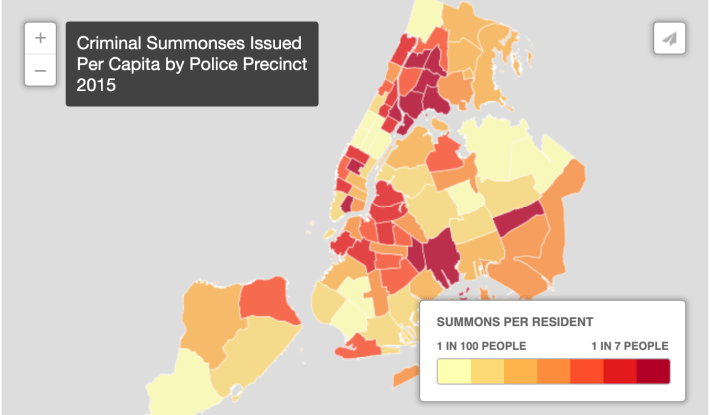
If alleged violators don't show up to their court date, a judge can issue a warrant for their arrest, and if a cop stops someone with an open warrant, they can send them to jail for around 24 hours before they can see a judge.
At the time of the reforms, around half of people with summonses missed their court dates and there were 1.5 million open summons warrants in New York.
Having to show up for a court date or spending a night in jail can cost someone a job, a bed in a homeless shelter, in-patient treatment, lead to loss of student loan funding, or deportation. A conviction can result in a permanent criminal record.
The law change moved many offenses to civil hearings in front of a judge with the city's Office of Administrative Trials and Hearings, and the policy led to a 90-percent drop in criminal court summonses.
Despite police's claims that they need the harsher penalty to hold e-bike riders accountable, appearance rates for those charged under the new civil structure were similar to those going to criminal court, a 2018 report on the Council's reform by the John Jay College of Criminal Justice found.
Is it legal?
Lawyers questioned how the NYPD could unilaterally upgrade a violation for breaking a red light, also known as a B summons, to a criminal charge. Cops previously slapped cyclists with tickets for riding on the sidewalk, but they relied a misdemeanor charge accusing the cyclist of also endangering people or property.
"What an ass-backwards way of trying to change the law. We’re just sending cops out with a different book of pre-printed forms," Vaccaro said. "It is not a crime."
The push is part of Mayor Adams's focus on so-called "quality-of-life" issues, and Lambright said the enforcement policy amounted to little more than City Hall theatrics — with legally questionable consequences.
"It’s a lot of Kabuki theater," the NYCLU lawyer said. "It just ensnares people in the criminal legal system where something as stupid as running a red light on a bicycle turns into an arrest.
"It’s bad policy as well as dubiously constitutional."
The NYPD's press office did not respond to a request for further comment, but the NYPD Traffic Division Commanding Officer Inspector Brian O'Sullivan has recently said the new policy would allow cops to better enforce cyclists, regardless of whether they had an identification on them or not.
"We have concurrent jurisdiction from the VTL B summonses to criminal court summons. And with these six violations we identified, we're gonna utilize the criminal court summons instead of the B summons. And so it doesn't matter if you have a license or not. So if you're out there and you're operating this recklessly, you'll be issued the criminal court summons." O'Sullivan said at a Council Public Safety Committee hearing on April 28, the day the new policy rolled out.
Cops could, of course, arrest someone if the person refuses to provide identification, but Vaccaro said that creates much more workload for officers than simply giving them a court summons ticket.
"It’s a time-worn police tool," Vaccaro said. "NYPD used to love writing those tickets to send people to summons court."
Cyclists are also less dangerous targets than drivers, because it's easier for drivers to hide a weapon, so cops can more easily rack up higher summons numbers, the attorney argued.
"There’s a danger to policing and approaching a car in a traffic stop," Vaccaro said. "If they have to do some enforcement, it’s fun to do it to cyclists, or at least it’s less unfun than it is to do to drivers."


